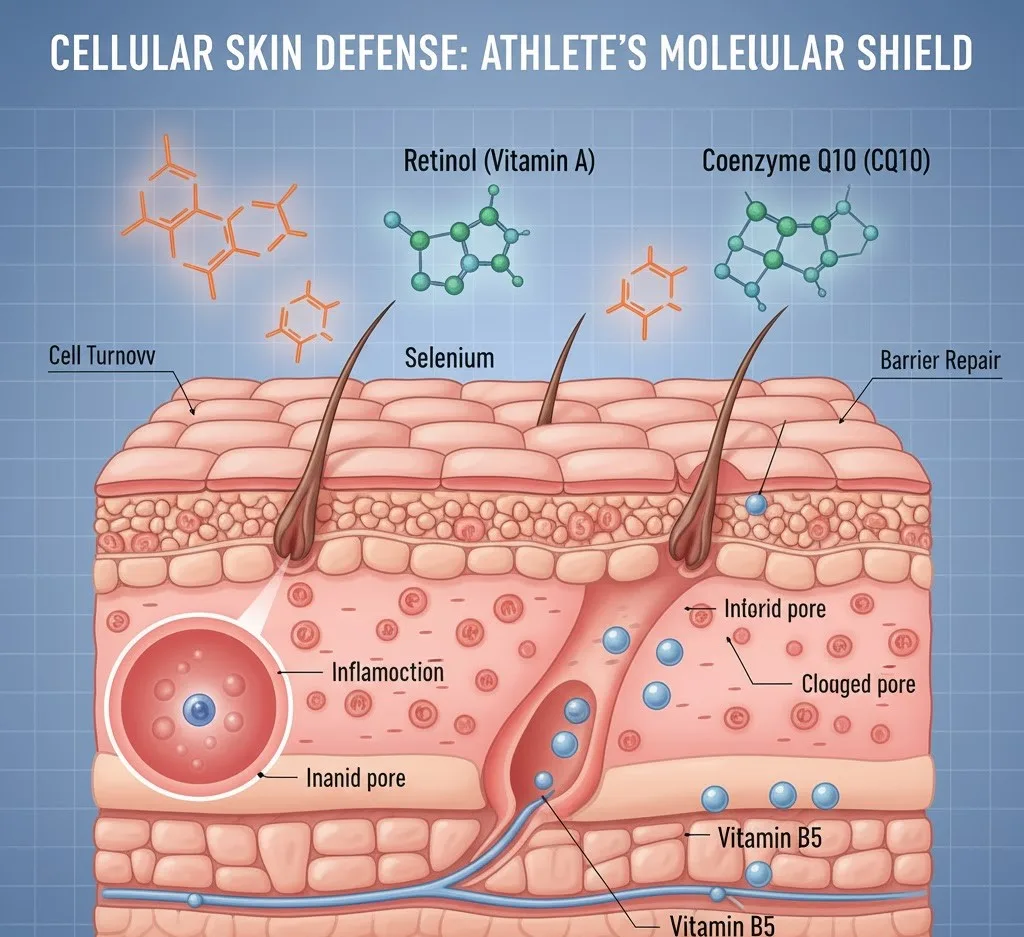For athletes striving for peak performance, the topic of performance-enhancing substances, including anabolic-androgenic steroids (AAS), is sometimes encountered. While the focus is often on muscle growth and strength, it's crucial to acknowledge the less-discussed but significant side effects, particularly those affecting skin health. Maintaining healthy skin is not just about aesthetics; it plays a vital role in an athlete's overall well-being and can impact comfort and confidence, both on and off the field.
Let's explore these in the context of an athlete's regimen.
Understanding the Challenge: Steroids and Skin
Anabolic steroids can disrupt the body's natural hormonal balance, leading to a range of dermatological issues. These commonly include:
-
Acne: Often severe, particularly on the face, chest, and back. This is due to increased sebum production and inflammation.
-
Oily Skin: Excessive oiliness can exacerbate acne and lead to discomfort.
-
Stretch Marks: Rapid muscle gain, sometimes associated with steroid use, can lead to stretch marks as the skin struggles to keep pace.
-
Skin Thinning or Fragility: Long-term use can sometimes affect skin integrity.
For athletes, these issues can be particularly problematic. Severe acne can be painful, affecting range of motion for some movements, and can certainly impact self-esteem.
Strategies for Skin Management: A Closer Look
Based on the provided information, here are key areas athletes might consider for managing steroid-related skin concerns:
-
Topical Vitamin A Derivatives (Retinols/Retinoids):
-
What they are: These are compounds derived from Vitamin A, known for their ability to promote cell turnover, reduce oil production, and unclog pores.
-
Athlete Relevance: For athletes dealing with steroid-induced acne, topical retinoids can be highly effective in managing breakouts and improving skin texture. They help to prevent the formation of new lesions and can fade post-inflammatory hyperpigmentation.
-
Considerations: Retinoids can cause initial dryness, redness, and sun sensitivity, making consistent sunscreen use paramount, especially for outdoor athletes.
-
-
Coenzyme Q10 (CoQ10) Supplementation:
-
What it is: CoQ10 is an antioxidant naturally produced by the body, playing a key role in energy production and protecting cells from oxidative damage.
-
Athlete Relevance: While primarily known for its benefits in heart health and energy metabolism, CoQ10's antioxidant properties could theoretically offer some protection against skin damage and support overall skin health. For athletes, who often experience increased oxidative stress, supplementing with antioxidants like CoQ10 might contribute to cellular resilience, including in the skin.
-
-
Selenium Plus Supplements:
-
What it is: Selenium is an essential trace mineral with antioxidant properties, crucial for immune function and thyroid health. It's often combined with other vitamins or minerals in "Selenium Plus" formulations.
-
Athlete Relevance: Like CoQ10, selenium's antioxidant power can help combat oxidative stress that might contribute to skin issues. It also plays a role in skin elasticity and protection. Adequate selenium levels are important for overall health, which indirectly supports skin integrity.
-
-
Moisturizing Creams:
-
What they are: Hydrating products designed to lock in moisture and protect the skin barrier.
-
Athlete Relevance: Even with oily skin, moisturizers are crucial. Harsh cleansers or acne treatments can strip the skin of its natural oils, leading to compensatory oil production and further irritation. Athletes who shower frequently after training need to replenish skin moisture to prevent dryness and maintain a healthy skin barrier. Look for non-comedogenic (won't clog pores) and fragrance-free options.
-
-
Body Shampoos/Washes Containing Vitamin B5 (Panthenol):
-
What it is: Vitamin B5 (pantothenic acid) and its derivative, panthenol, are humectants that attract and hold moisture, also possessing anti-inflammatory properties.
-
Athlete Relevance: For athletes who experience body acne (bacne, chest acne) due to steroid use and frequent sweating, a gentle body wash containing B5 can be soothing and hydrating without being overly harsh. It helps maintain the skin's moisture barrier, reducing irritation and dryness often associated with acne treatments.
-
-
Sulfate-Free Shampoos:
-
What it is: Shampoos that do not contain sulfates (like sodium lauryl sulfate), which are detergents that can be harsh and stripping.
-
Athlete Relevance: While primarily for hair, the runoff from shampoo can affect facial and body skin. Sulfates can irritate sensitive skin, potentially exacerbating facial or hairline acne. A sulfate-free shampoo can be a gentler option for athletes, especially those with sensitive skin or existing acne concerns, reducing the likelihood of skin irritation.
-
The Broader Picture for Athletes
It's vital for athletes to remember that these are symptomatic management strategies. Addressing the root cause – the use of steroids – is the most effective way to prevent and mitigate severe side effects. Consultation with medical professionals is paramount for any athlete considering or using performance-enhancing substances. A doctor can provide personalized advice, monitor health, and recommend appropriate and safe treatment plans for any associated health concerns, including skin issues.
Maintaining good hygiene, a balanced diet rich in antioxidants, and proper hydration are also foundational elements of skin health for any athlete, regardless of other factors.

